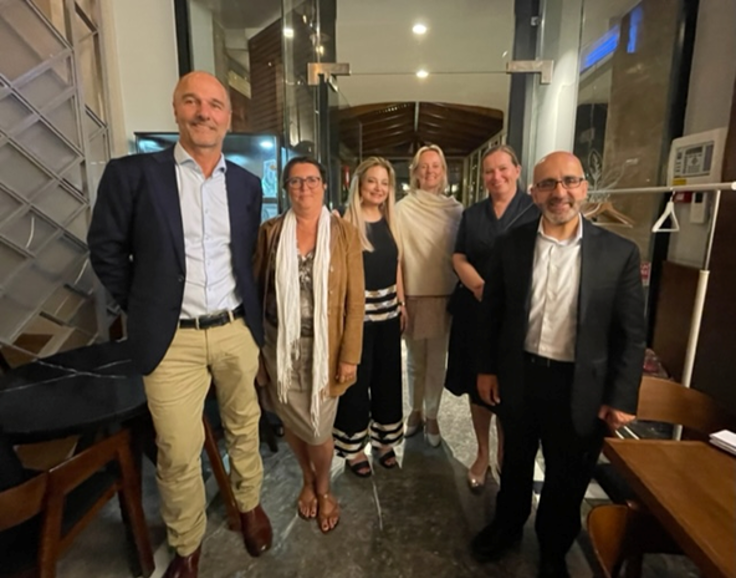The BIS program visits Palestine
News
|Published
The Norwegian Institute of Public Health (NIPH) travels to Ramallah in Palestine to continue work in strengthening the Palestinian National Public Health Institute.
This news article is older than 30 days and the information may be outdated
Go to the home pageThe Norad-financed partnership program, Building Stronger Institutions and Systems (BIS), launched in July 2021 with a goal to contribute to the building of competent and resilient health systems underpinned by strong public health institutions in 6 countries, through global and regional work. One of our projects is in Palestine, in partnership with the Palestinian National Institute of Public Health (PNIPH). There are many challenges in Palestine. Risk analysis is not simply a bureaucratic exercise, but a comprehensive and continual reflection on how we can handle a demanding context as sensitively as possible.
Establishment of the Palestinian National Public Health Institute
Work in Palestine actually started in 2009, before the launch of the BIS program, with the first study grant from the Norwegian Ministry of Foreign Affairs to the World Health Organization (WHO), with NIPH as a consultant. Since 2012, Norwegian authorities have collaborated with the WHO and the Palestinian Ministry of Health to support the establishment of PNIPH as an independent entity under the Palestinian Authority (PA). This is both part of state-building and the work for a two-state solution, as well as a contribution to better public health for the Palestinian population. PNIPH will transfer from being a project under the WHO to becoming an independent institute under the PA, supported by the Prime Minister’s Office. The establishment of PNIPH as a national Palestinian public health institute was established in law in 2016.
After several delays, the goal now is that the transfer of PNIPH from being a project under the WHO to being an institution under PA will be carried out in the period 2021-2024. In January 2022, the Board of PNIPH was appointed, with the Prime Minster as the Chairman of the Board and the Minster of Health as Deputy Chairman. In April, a separate budget line was included for PNIPH in the PA’s budget for the first time. This is a real breakthrough and shows momentum; but of course, we know that a lot can happen.
Main activities of the new programme
NIPH has two main activities in the Palestine-BIS project. The overall goal is to collaborate on organizational development, with the intention that PNIPH is strengthened through professional scientific collaboration and support for research education. PNIPH needs to establish its own processes, basic documents and tools. Through workshops and discussions, we are together identifying where NIPH can contribute by sharing knowledge and experiences and working together on specific tasks. NIPH have so-far worked with organizational development, competence building, data management, strategy, financing, collaboration with other partners, and communication.
The BIS program collaborates in six countries. One of the core principles of BIS is to “take context as starting point”. This means that we cannot have the same approach in each country, but instead must work within each of the specific contexts, with their unique challenges and resources. We must identify the areas that are in demand, and see what is possible for collaboration in each individual context.
BIS Project Director at the NIPH, Ragnhild Dybdahl, said;
“Through this work, the NIPH are also challenged and learn new things, which will only strengthen our contribution to global health work, as well as in Norway. For me who is new to the BIS program, it is fantastic – in fact, touching – to see the warmth and the bonds between the partners at NIPH and PNIPH who have worked together for a long time. Our Palestinian colleagues stress how important this long-term support has been – both professionally and interpersonally. I am reminded again that we should not underestimate the importance of relationships. Evaluations of partner programs often find that long-term collaboration is essential, and my impressions so far – not least from our visit this month – certainly support this.”


